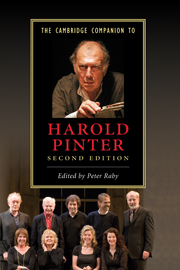Book contents
- Frontmatter
- Introduction
- Part I Text and Context
- Part II Pinter and Performance
- Part III Reactions to Pinter
- 14 Pinter’s sexual politics
- 15 Pinter and the critics
- 16 Pinter as celebrity
- 17 Pinter, politics and postmodernism (2)
- 18 The Pinter paradigm: Pinter’s influence on contemporary playwriting
- 19 Afterword: Harold Pinter and cricket
- Bibliography
- Main Index
- Works Index
- Series List
14 - Pinter’s sexual politics
from Part III - Reactions to Pinter
Published online by Cambridge University Press: 28 November 2009
- Frontmatter
- Introduction
- Part I Text and Context
- Part II Pinter and Performance
- Part III Reactions to Pinter
- 14 Pinter’s sexual politics
- 15 Pinter and the critics
- 16 Pinter as celebrity
- 17 Pinter, politics and postmodernism (2)
- 18 The Pinter paradigm: Pinter’s influence on contemporary playwriting
- 19 Afterword: Harold Pinter and cricket
- Bibliography
- Main Index
- Works Index
- Series List
Summary
Pinter's theatre is a theatre of images involving domestic violence, territorial struggles and linguistic conflict. As the conflictual range of responses indicates, the dramatic syntax of these images remains paratactic, both generically and linguistically, difficult to articulate as tragicomedy or through the existing grammar of social relations. Events and relationships are framed within socially intelligible and dramatically 'powerful' situations in ways which resist the dramatic conventions of naturalism or realism. The tension between rhetoric and grammar enables a figurative diversity of conversation which has come to seem recognisably 'Pinteresque', a comically pregnant moment of conversation which dwells in a menacingly tragic absence of social recognition. The enigmatic particularity of dramatic images is both a principle of dramatic construction in Pinter's work and a key dynamic in performance. Precise theatrical presentation makes it difficult to describe or narrate the suggestive power of these images in non-dramatic or non-theatrical terms. As Pinter himself put it: 'To supply an explicit moral tag to an evolving and compulsive dramatic image seems to me facile, impertinent and dishonest.' To interpret his plays symbolically or allegorically also does violence to Pinter's precise art. But to the extent that his images generate metaphors of more general concerns, they need to be considered as socio-political representations of power. Based principally on The Birthday Party, The Caretaker and The Homecoming, Pinter's reputation was fostered in opposition to the forms of political theatre which emerged in the 1950s and persisted into the 1970s.
- Type
- Chapter
- Information
- The Cambridge Companion to Harold Pinter , pp. 233 - 248Publisher: Cambridge University PressPrint publication year: 2009
- 4
- Cited by

